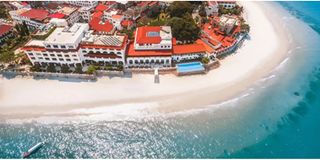ZIPA warns of illicit foreign land acquisition, unregulated BnBs

What you need to know:
- In an exclusive interview with The Citizen, Executive Director of the Zanzibar Investment Promotion Authority (ZIPA), Saleh Saad, stressed that foreigners must obtain an investment certificate from ZIPA before acquiring land
Unguja. Zanzibar is grappling with a critical issue; illegal foreign land acquisition and unregulated business operations that undermine local laws and disrupt fair investment practices.
In an exclusive interview with The Citizen, Executive Director of the Zanzibar Investment Promotion Authority (ZIPA), Saleh Saad, stressed that foreigners must obtain an investment certificate from ZIPA before acquiring land.
“The ZIPA Act No 10 of 2023 prohibits investors from acquiring land from local communities without prior approval and strictly forbids bribery of public officials. We collaborate with other sectors, such as the Ministry of Lands, Immigration, and the Zanzibar Tourism Commission (ZCT) to enforce these regulations,” Mr Saad explained.
He added, “We are aware of some private consultants and individuals who help foreigners acquire land without following the required guidelines. Therefore, if someone buys land and seeks a lease from the Land Commission, they will not be granted the lease without a ZIPA Certificate.”
Mr Saad further detailed that ZIPA must conduct due diligence on the location and type of project before approving land leases.
To be considered an investor, one must invest a minimum of $2.5 million in hotels and real estate, while other projects require a minimum investment of $500,000.
However, projects in Bed and Breakfast (BnB) establishments do not qualify as investment projects, though they are recognised as a global business model operated by both locals and foreigners.
He also noted that The Zanzibar Commission for Tourism is working on regulations to guide and streamline the BnB business.
We are aware that both locals and foreigners are buying or renting properties to turn them into BnBs, which is why we are preparing regulations for real estate investment.”
Mr Saad acknowledged the risks posed by the proliferation of unregulated BnBs to established hotels that comply with tax regulations.
“Currently, BnBs are operating illegally because they do not pay taxes. While acknowledging the global trend toward such accommodations, we must protect the 700 registered hotels. If all guests choose BnBs, it could undermine the entire industry. Therefore, regulation is crucial.”
ZIPA, established under the Zanzibar Investment Promotion and Protection Authority Act, No. 14 of 2018, serves as the central body for promoting and facilitating investment in Zanzibar while ensuring compliance with local regulations.
According to the Tourism Act No 6, all business activities in Zanzibar are open to investors, except for sectors reserved solely for Zanzibaris and Tanzanians, such as wholesale and retail shops, tour operators, guest houses, travel agencies, ice cream shops, and supply services.
In July 2024, the Ministry of Tourism and Heritage, in conjunction with the Zanzibar Tourism Commission, introduced regulations for non-hotel tourist accommodations in response to the rise of ad hoc tourist lodgings in private residences.
Zanzibar's Minister of Tourism and Heritage, Mudrick Ramadhani Soraga, announced that accommodation providers must seek registration from the Tourism Commission.
"These regulations apply to both locals and the diaspora. To obtain a license, the Tourism Commission will inspect accommodations to ensure they meet all business standards," he explained.
Mr Soraga detailed that registration fees are Sh150,000 for the Mjini Magharibi Region and Sh250,000 for other regions. Section 31(1) of the Zanzibar Tourism Act No. 6 of 2009 empowers the minister to enact these regulations.
He warned that licenses may be revoked if obtained fraudulently, used for prohibited activities, or if terms and conditions are violated. Offenders face fines ranging from $1,000 (Sh2.7 million) to $5,000 (Sh13.2 million) or imprisonment for three months to five years.
However, he clarified that not all areas are approved for this type of business. Approved areas in the Mjini Magharibi Region include Stone Town, Mlandege, Fumba, Bububu, Chukwani, and Mbweni.
Despite these regulations, there has been a noticeable increase in foreign activity involving land acquisition and business operations without proper registration at ZIPA.
Areas such as Jambiani, Bwejuu, Paje, Michamvi, Stone Town, Mbweni, and Bububu have witnessed numerous cases of foreign nationals bypassing ZIPA regulations.
The Land Tenure Act, No 12 of 1992, amended by Act No 11 of 2010, strictly regulates land ownership and usage rights.
These illegal activities not only have immediate financial implications but also pose a significant threat to the local economy, undermine fair competition, and erode trust in the regulatory framework designed to protect Zanzibaris.
The authorities are increasing scrutiny of land transactions, enforcing stricter compliance checks for business operations, and cracking down on tax evasion and corruption.





